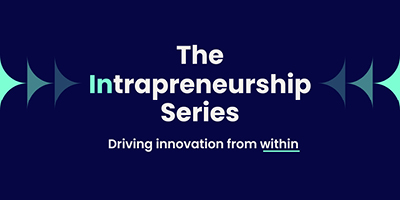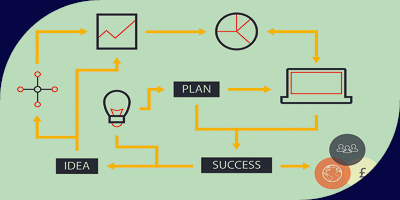Fostering an intrapreneurial culture

When people go to work, they want to make a difference and to feel that their contribution matters. That was a really important message that came out of The Open University’s (OU) recent webinar Fostering an intrapreneurial culture.
It was the second webinar in the OU’s The Intrapreneurship Series: Driving innovation from within, and it focused on how organisations can enable an intrapreneurial culture, by leveraging the skills normally seen with entrepreneurs internally. Josh Valman, an innovation adviser and CEO of engineering consultants RPDK, was the host, with three speakers on the panel – Maria Chenoweth, Chief Executive at the charity retailer Traid and co-founder at Charity Super.Mkt, Duncan Levesley, Director at professional services company Grant Thornton and Darryl Merkli, Head of AI Studio & Services at digital marketing agency HUT 3.
The importance of culture
They all agreed that culture is key to intrapreneurial thinking. Employers need to ensure employees know their contribution and ideas are important and that they will be listened to, whatever their level of seniority. “To build a culture of intrapreneurs, we need to create space,” said Josh. “That may mean a distraction from day-to-day work, but you need to show that you have a need for their contribution.”
Duncan has been helping businesses grow for most of his career and he thinks intrapreneurialism is never far from the surface. “Good ideas are already there in the business a lot of the time. One of the important things for unlocking innovation in business is getting decisions made.”
But he said lack of support often gets in the way. “I think one of the biggest blockers to innovation is a lack of support from the management team.” Duncan said it’s vital that budding intrapreneurs are encouraged to speak up and test out their ideas, see what works and what doesn’t. Maria couldn’t agree more – that’s how she likes to get ideas off the ground. When she trialled a home collection service at Traid, she started with a small pilot, using one of the company vans to deliver fliers advertising the scheme. It was successful, so that’s when she went to the board to talk budgets and rolling it out more widely.
Maria thinks intrapreneuralism flourishes when people are engaged with their work. “I give people what they really enjoy and they thrive.”
Give people permission to fail
Ideas do not always work though. Having an intrapreneurial culture means accepting the possibility of failure or that ideas need to be reworked.
Intrapreneurship requires you to be comfortable with failure because you're going to come up against a lot of things. Failure has been an important part of our process.
Darryl Merkli, HUT 3
Darryl said change happens so quickly and continuously now that in an innovative organisation like his, it’s important to have a framework in place to assess new tools and applications. HUT 3 also has a roadmap, so everyone knows the direction of travel. There’s enough flex in the roadmap so that if something groundbreaking emerges, it can be explored, but not so much that the focus keeps shifting. “That roadmap needs to be fairly rigid – if we are constantly moving the goalposts or focusing on new objectives, we’ll never get anything done.”
Watch webinar
Further information
Please contact us to speak to one of our business team advisors.
Not on our mailing list?
Sign up to receive regular emails that are full of advice and resources to support staff development in your organisation.


